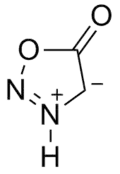Sydnone
Sydnones are mesoionic heterocyclic chemical compounds possessing a 1,2,3-oxadiazole core with a keto group in the 5 position.[1][2][3] Like other mesoionic compounds they are di-polar, possessing both positive and negative charges which are delocalized across the ring. Recent computational studies have indicated that sydnones and other similar mesoionic compounds are nonaromatic, "though well-stabilized in two separate regions by electron and charge delocalization."[4] Sydnones are a heterocyclic compound named after the city of Sydney, Australia.
 | |
| Names | |
|---|---|
| IUPAC name
2H-Oxadiazol-5-one | |
| Other names
1,2,3-Oxadiazol-5(2H)-one | |
| Identifiers | |
3D model (JSmol) |
|
| ChemSpider | |
PubChem CID |
|
| |
| |
| Properties | |
| C2H2N2O2 | |
| Molar mass | 86.050 g·mol−1 |
Except where otherwise noted, data are given for materials in their standard state (at 25 °C [77 °F], 100 kPa). | |
| Infobox references | |
A sydnone imine in which the keto group of sydnone (=O) has been replaced with an imino (=NH) group can be found as a substructure in the stimulant drugs feprosidnine and mesocarb.
Discovery
Sydnone was first prepared in 1935 by Earl & Mackney by cyclodehydration of N-Nitroso-N-phenylglycine with acetic anhydride.[5] Later work showed that this could be applied fairly generally to the nitrosamines of N-substituted amino acids.[2]
Chemical structure

Examples
- Cefanone (Cephanone)
- Ipramidil
- 3-Thiomorpholino-sydnonimine U.S. Patent 4,332,801
- The reaction between methyl 3-benzyl-sydnone-4-acetate and diphenylacetylene is described in Ex1 of GB 1387306 gives an analog of Bufezolac.
- Synthesis and Biological Evaluation of Coumarinyl Sydnone Derivatives.[6]
References
- IUPAC, Compendium of Chemical Terminology, 2nd ed. (the "Gold Book") (1997). Online corrected version: (2006–) "sydnones". doi:10.1351/goldbook.S05990
- Stewart, F. H. C. (1 April 1964). "The Chemistry of the Sydnones". Chemical Reviews. 64 (2): 129–147. doi:10.1021/cr60228a004.
- Browne, Duncan L.; Harrity, Joseph P.A. (January 2010). "Recent developments in the chemistry of sydnones". Tetrahedron. 66 (3): 553–568. doi:10.1016/j.tet.2009.10.085.
- Simas, Alfredo (1998). "Are mesoionic compounds aromatic?". Canadian Journal of Chemistry. 76: 869–872. doi:10.1139/v98-065.
- Earl, J. Campbell; Mackney, Alan W. (1935). "204. The action of acetic anhydride on N-nitrosophenylglycine and some of its derivatives". Journal of the Chemical Society (Resumed): 899. doi:10.1039/jr9350000899.
- Patel, Keshav C.; Patel, Himanshu D. (2011). "Synthesis and Biological Evaluation of Coumarinyl Sydnone Derivatives". E-Journal of Chemistry. 8 (1): 113–118. doi:10.1155/2011/705856. ISSN 0973-4945.
- S. Wiechmann; T. Freese; M. H. H. Drafz; E. G. Hübner; J. C. Namyslo; M. Nieger; A. Schmidt (2014). "Sydnone anions and abnormal N-heterocyclic carbenes of O-ethylsydnones. Characterizations, calculations and catalyses". Chem. Commun. 50: 11822–11824. doi:10.1039/C4CC05461J.
- Claude V. Greco; Wayne H. Nyberg & C. C. Cheng (1962). "Synthesis of Sydnones and Sydnone Imines". Journal of Medicinal Chemistry. 5 (4): 861–865. doi:10.1021/jm01239a022.
- Wilson Baker; W. D. Ollis (1957). "Meso-ionic compounds". Quarterly Reviews, Chemical Society. 11: 15–30. doi:10.1039/QR9571100015.
- Joseph Fugger; Jack M. Tien & I. Moyer Hunsberger (1955). "The Preparation of Substituted Hydrazines. I. Alkylhydrazines via Alkylsydnones". J. Am. Chem. Soc. 77 (7): 1843–1848. doi:10.1021/ja01612a039.
- Jack M. Tien & I. Moyer Hunsberger (1955). "The Preparation of Substituted Hydrazines. II.1 3-Pyridylhydrazine via the Phototropic N-(3-Pyridyl)-sydnone". J. Am. Chem. Soc. 77 (24): 6604–6607. doi:10.1021/ja01629a052. 88, 178 (1961);
- Jack M. Tien & I. Moyer Hunsberger (1961). "Sydnones. III. Preparation and Interconversion of Mercurated Derivatives of N-(3-Pyridyl)-sydnone1-3a". J. Am. Chem. Soc. 83 (1): 178–182. doi:10.1021/ja01462a035.
- Alan R. Katritzky (1955). Chem. Ind.: 521. Missing or empty
|title=(help), (); - Alexander Lawson & D. H. Miles (1959). "Some new mesoionic compounds". J. Chem. Soc.: 2865–2871. doi:10.1039/JR9590002865.
- J. Ogilvie; V. K. Miyamoto; Thomas C. Bruice (1961). "A Kinetic Study of the Reaction of a "Meso-ionic" Compound (Dehydrodithizone) with Haloacetates". J. Am. Chem. Soc. 83 (11): 2493–2495. doi:10.1021/ja01472a017.
- LEMONT B. KIER, LAURETTA E. FOX, D. DHAWAN & I. W. WATERS (1962). "A New Class of Central Nervous System Stimulants". Nature. 195 (4843): 817–818. Bibcode:1962Natur.195..817K. doi:10.1038/195817a0. PMID 14455827.CS1 maint: multiple names: authors list (link)